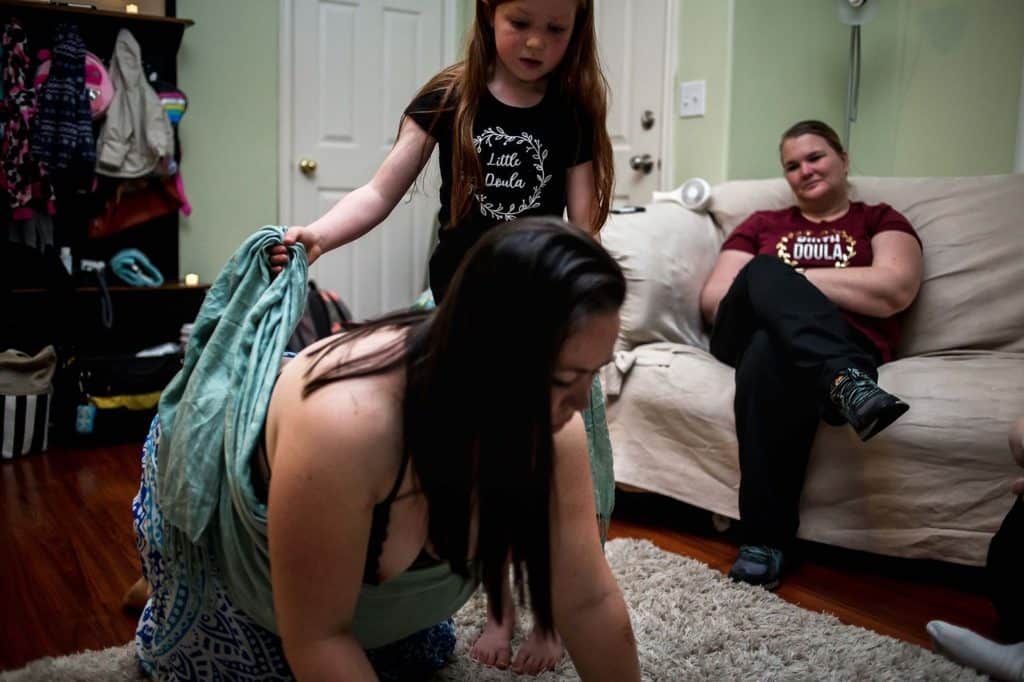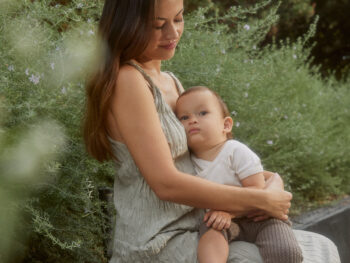I will never forget the day I pulled out my phone and searched how to become a doula.
My interest in helping couples through birth was sparked after my second birth. In fact, I was in the dark recovery room holding my baby, googling how to become a doula — I was just so excited to learn more.
After the delivery of my first child by cesarean, I desired a VBAC and felt good about my choice. At the hospital, I requested a nurse who was not only supportive of going natural but also comfortable with TOLAC.
Those hours that she was on shift were amazing. Before she became a nurse, she was a doula and truly brought a loving, supportive vibe to the room. She applied counter pressure and helped me along the way with each contraction and question I had.
This nurse, with previous training as a doula, fought hard for me. She asked the provider for things that would help my labor continue and kept me informed about my VBAC. Sadly, her shift ended before I had my baby. I actually wrote her a thank you letter because she stood out so much.
In this article, I want to talk about becoming a doula, what the process was like for me, and different ways to get started on your journey to a new doula career. I’ll also cover all the ways you can get trained and certified as a doula, so you can be in the best position to support expecting parents.
Requirements to become a doula
One of the most commonly asked questions about becoming a doula is what the requirements are. The answer may differ from place to place.
However, most states and countries do not require a doula to have any specific training or certifications. Anyone who supports someone during birth may be considered a doula.
Even though there are no legal requirements in most locations around the world, I want to discuss the importance of being trained and even certified as a doula.
How long does it take to become a doula? In most cases, anywhere from eighteen months, to as long as four years. However, many doulas have become certified in less time than that.
Emotional support is one of the number one contributions a doula provides to a couple in labor. But that is just one of the many important roles a doula plays.
Working as a doula
When deciding to become a doula, it’s important to consider what the job will entail. There are many ways to specialize in your practice and some unique demands that you must be prepared to handle.
Asking yourself these questions can help you prepare for this rewarding and challenging work.
What kind of doula do you want to become?
Doulas are mostly known for their work in supporting parents during labor and delivery. But there are many aspects of becoming a parent that doulas can help with, and many choose to specialize in one area.
Birth doula
A birth doula joins a couple during the labor and birth of their baby. This means being on call — you will be called out at any time of the day or night. Birth doulas are often required to work long hours, staying with the birthing parent during the entire period of labor. Working as a birth doula is so rewarding but can also be an exhausting role.
Doulas help during labor with support like applying counter pressure and assessing the baby’s position based on a labor pattern or where the birthing person feels contractions.
Doulas also support the birth partner by offering tools and suggestions along the way. They can offer additional help to the birthing partner by providing relief, food, and emotional support.

(photo cred: Wild Oak Birth)
Antepartum doula
The role of an antepartum doula is educating and providing support during pregnancy leading up to the birth of the baby. Rather than assisting during labor and birth, they provide additional support during the prenatal period.
This type of doula is common in higher-risk pregnancies where a birthing parent may need extra support in lessening stress and anxiety going into the birth. With a difficult pregnancy, there may be physical limitations like being confined to bed rest and added emotional stress. Antepartum doulas specialize in helping families cope, providing knowledgeable and compassionate support.
Postpartum doula
Postpartum doulas provide support in the home after the baby is born. This may include helping during late nights with the new baby, or cleaning and cooking for the parents to lesson the jobs around the house so they can bond and be with their baby.
Surrogate and Adoption doula
Some doulas specialize in helping a couple and the birthing family during the emotional journey of adoption or surrogate pregnancy.
This role may be to support the birthing parent during labor and delivery, or supporting a family as they welcome their new baby.
Bereavement doula
A bereavement doula supports a family who is experiencing an expectant loss. They provide emotional and physical support during miscarriage, stillbirth, or when there is an expectation that the baby won’t survive.
This role is very hard emotionally. Supporting someone through pregnancy loss can be very heavy. As a doula, no matter what role you are in, it is crucial to leave work at the door and not carry it into your home life. These boundaries are difficult in many professions, but especially as a bereavement doula.
Grieving families need love and support. If you are considering this path, I suggest taking a course on how to support families through loss. I highly suggest checking out Stillbirthday.
Sibling doula
Sibling doulas specialize in supporting the birthing couples child(ren), including them as the birthing couple desires, and supporting them during the birth of their sibling.
Working with the family for some time beforehand is essential. It is helpful to get a feel for how much knowledge the child has about birth and what may or may not scare them. Also, letting the child or children get to know you a little better will be beneficial so they feel comfortable with you on the birthing day.

(Photo Cred: Yellow Kite Lifestyle Photography)
What kind of home support do you have for yourself?
Being a doula requires a lot of support from your family. There are times when you may have to be gone in the middle of the day, or you may need to be gone all night which may leave you tired the following day.
Often, you will experience seeing something very hard and need support to process once you return home.
As a doula, I once supported a family going through a heavy time. The father was suffering from cancer, and I was hired to support them during the birth of twins. When it came time to push, we called the father who had been attending from home via video chat because he was too weak to attend the long labor.
Once he arrived, we went down to the operating room. Things went great with baby A. He came out crying and all was well. But then baby B started to struggle with his oxygen.
The provider looked at the mother and said, “I am so sorry, but we need to do an emergency C-Section.” Things got pretty crazy from there. I was struggling hard to keep it together for the family.
After I left the birth, I called one of my doula friends and just offloaded my emotions to her. Less than a year later, when I received news that the father passed, I sat in the arms of my husband, who held me while I cried.
During those moments, I don’t know what I would have done without their support.
I have also had very long births where I came home so tired that I could not be a mother to my children. My husband called in, missed classes, and found babysitters for me so I could rest. I always know my family will be taken care of because I have such an incredible support team.
If you have children, you may need to hire a nanny or on-call babysitter. It is crucial to have support at home when you are a doula.
What is your availability?
Depending on what type of doula you want to become, you may need to be prepared to leave on short notice, and be gone for many hours.
The second birth I attended as a doula, I was away for 36 hours. It was long and hard on myself and my family.
You may want to consider working with another doula as a partner. Your partner can help support you, so you do not have to be away for too long, or can back you up if you are unable to leave when a couple needs you.
Location
Are you limited to supporting at certain birthing locations? Some doulas are uncomfortable supporting couples at certain locations such as hospitals, at home, or at a birth center.
In addition to birthing locations, it is important to determine how far you are willing to travel.
Doula salary
The doula salary varies anywhere from $400 to $1400 per birth, depending on the state, location, and experience.
Some doulas who are not yet certified or don’t have many births under their belts may tend to want to charge less. I encourage you not to do this.
Learn the average doula rate in your area, and work within it. Doula burnout is a real thing. Working the long shifts required of a birth doula is not sustainable if you do not charge enough.
Take into consideration how much you may have to pay for childcare, travel, and other expenses while attending prenatal visits and births. There are also professional costs to consider, like ongoing doula training and certifications, which you should factor into your fees.
Doula certification
It is not a requirement to become certified as a doula. However, it is encouraged and provides a big advantage to your practice and your clients.
Without proper training and understanding of birth, it may be hard to truly impact a birth in an educational and physical way. Doulas provide emotional, physical, and educational support. Certification programs provide training in all three of these areas.
Through certifications with organizations like DONA International and CAPPA, you will learn more about the roles of a doula. You will learn ways to help babies get in a better position, how to provide support without stepping outside of your scope, and how to facilitate the health care provider.
Certifying and getting proper training is something potential clients may desire. It shows dedication and brings comfort to couples knowing that you are trained and prepared to attend their birth.
Certifications vary depending on the organization that you certify with. Typically, you will attend a course that may average 10-48 hours worth of learning. You will then have to meet a list of requirements such as attending a certain number of births, writing papers, or reading books.
If you are interested in becoming certified through The VBAC Link, we do not require previous doula training or certification but do suggest it. This is also the case with other advanced doula certifications.
Doula Certification Cost
Depending on the provider, a doula certification program can cost you anywhere between $300 and $3500. The cost will depend on whether your certification requires a lot of classes, additional study materials, certification fees, and membership fees.
If you wish to learn related topics like breastfeeding support, babywearing, etc, you will need to attend the additional courses which will add to the total cost.
Investing in doula training is entirely voluntary, since doulas are not medical practitioners. However, certification costs are worth it to ensure you can provide quality birth support — and you’ll have credentials that will help you get more clients.
Best doula training
In addition To DONA International and CAPPA, there is also Childbirth International, ICEA, and many more that may be more local to you and your area.
To choose the best doula training, I suggest looking into many programs to see what their training entails. Consider your individual needs, such as how much time and money you want to invest in training, and what best fits your desires in supporting others as a doula.
Next steps to begin your doula training
If you have decided that becoming a doula is the right thing for you, I want to say CONGRATS!
It has been a life-changing journey for me, and I feel so lucky to be supporting clients. I have been able to meet so many incredible families doing this work. My clients are my friends, and I will cherish their friendships forever.
Once you have taken your training and are ready to go, I encourage you to get in touch with your local doula community and get involved. Word of mouth is the best way to gain clientele.
I also encourage you to get to know those providers who work in the birth community like chiropractors, midwives, OB’s, prenatal massage therapists, and birth photographers. These people can be great allies when it comes to gaining clients and friends.

(Photo Cred: Elizabeth Ashdown Photography)
Frequently asked questions
How much does it cost to become a doula?
Becoming a doula may cost anywhere from $300 to $3,500, depending on the course and certification process. Some training programs come with a lot of extras or additional expenses.
How much money does a doula make?
A doula can make anywhere between $400 to $1,400 per birth and sometimes more, depending on the going rate for doulas in their community.
How long does it take to become a doula?
Most doula training has a one or two day course, and then a list of requirements for the final certification. It may take one month to complete, or even years depending on the doula’s motivation and availability.
What’s the difference between a doula and a midwife?
Midwives provide support to birthing couples, however, that includes medical support during the birth. This is where a midwife and doula are different. Doulas provide emotional, physical, and educational support, but do NOT provide any medical advice or procedures.














 Plus Size Birth: What New Moms Need to Know
Plus Size Birth: What New Moms Need to Know
Thank you for including CAPPA in your list of potential Doula training and certifying organizations!
Hi, Im a sophomore in college majoring in child development and I have recently learned about doula’s. I eager to learn how to begin the process of becoming a doula.
I am interested in becoming a doula- but I’ve heard it isn’t a “stand alone” career. Any ideas of what I could do to make a living alongside being a doula? How can I pursue this but also provide for myself?
My name is Amy and I was talking to a friend about becoming a Doula .. Please help me to find the direct I need to pursue a career with this
Thanks for explaining how the training of a birth doula works. My sister is thinking about looking for one because she is thinking about having a natural home birth. As such, it would be important to eliminate everything that can pose a risk for that.
Hello,
I am 19 years old, almost 20. I want to go to college and get a degree, but would like it to be beneficial to my goal of becoming a doula once I graduate. Do you have any recommendations for what degree I could go for that would help me succeed as a Doula?
You might look into a degree related to community health.